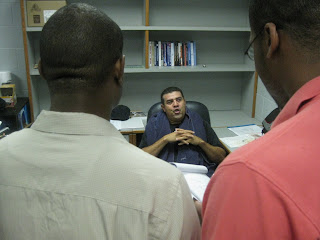
By Juan López
Luis Sojo knows the trials and tribulations young baseball players face when moving to a different country to play baseball — after all, the 43-year old, Venezuelan-born former major leaguer underwent the same transition as a youngster.
It wasn’t easy.
“It was extremely difficult for me because I only had one Latin teammate when I came here,” Sojo, now the manager of the Tampa Yankees in the Advanced A league, said. “So I had no other choice but to speak English. When I got to the instructional league, (the Dominican teammate) and I would practice our English on each other. We would go to restaurants and he would say, ‘Let me order this time.’
“Of course they wouldn’t understand us and we left frustrated.”
Now, with many Hispanic players on his roster, Sojo is going out of his way to help them make the transition to the United States.
Jesus Montero, a 19-year old catcher from Venezuela and the second-best prospect in the New York Yankees farm system, said Sojo made his move to the U.S. much smoother.
“I felt comfortable when I got here,” Montero said. “I can play at ease for him, but when I have to play hard, he lets me know. He’s going to tell me, ‘Don’t do this, do this.’ But he’s not going to yell at me or something like that. I’m just really comfortable with him.”
While Montero pointed to Sojo’s personality as a manager as his strong point, his teammate, Walter Ibarra, said his connection with Sojo came from the pair’s native tongue — Spanish.
“I’ve had American managers before and while they’re good managers, when one doesn’t fully understand what they’re saying it causes a lot of problems,” the 21-year old shortstop from México said. “But being able to speak with Luis makes things so much easier. He gets along with everybody and that gives us confidence to play better.”
Adjusting to a whole new culture may be terrifying for some ballplayers. The foods are different, the language is different, even the mannerisms are different. But Sojo doesn’t feel sorry for them.
“Because these guys come over here so young, it’s very difficult,” he said. “But one has to understand that you are now a man and as a man, you must make your own decisions and work hard to make your dreams come true because you chose this. You didn’t choose to be a doctor, you chose to be a ballplayer. So if you maintain yourself properly mentally, everything will be OK.”



